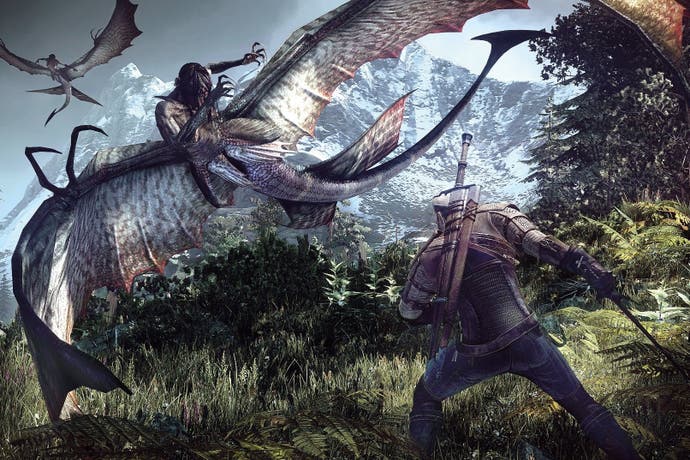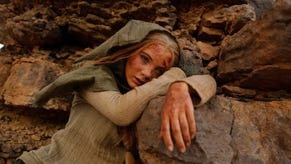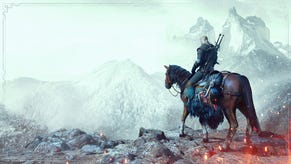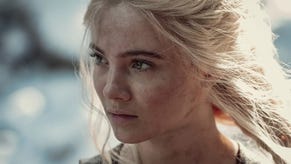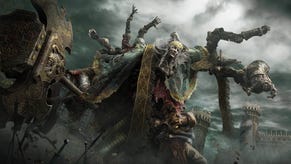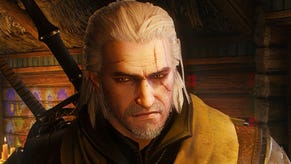Unwrapping the open world of The Witcher 3: Wild Hunt
A Rivia runs through it.
It's always been about how well The Witcher 3 occupies an open world that really mattered. That's the big differentiator, where the game will achieve greatness or become, simply, nice. We know from The Witcher 2 developer CD Projekt Red can serve up delicious chunks of game across several acts. But when the walls come down and everything, whoosh, spreads out - what happens then?
In some games like Skyrim the open-world is entirely the point and the game wouldn't work without it, whereas other games feel enlarged for the sake of it, and bloated because of it. Sometimes an open world justifies the game, sometimes the game tries to justify an open world.
In The Witcher 3, the open-world makes sense. I play for four-and-a-half hours and I travel around a world that feels real to me. A village sprawls loosely down a river bank how I expect it might, were it real, with soldiers who've made camp around a ruined tower along the coast. There aren't endless buildings and quests but a careful selection, and all of this allows what's in front of you to breathe. Because I don't have to do so many things, I pay more attention to the things I do, and to the world around me. I look up from my journal, if you like.
In deference to exploration you're given a horse, lovably named Roach, early on, and you can climb and jump and explore with fluidity where you couldn't in games before. Also encouraging you off the beaten track are your heightened mutant senses, which have you play hunter and detective. It's a bit like being Sherlock Holmes: clues materialise before you and when examined, you audibly pick them apart, making the kind of deductions an expert monster hunter - possibly even a genius - would. There's a wolfish wonder to following a scent or a track, too - it all makes for a refreshing, thoughtful reprieve.
Your senses tie-in to a deeper monster hunting mechanic that has you fill a bestiary with knowledge to instruct and prepare you for bigger fights to come. You'll need the help: it's a tough old world that I died in often. But it doesn't feel unfair, and the checkpoints are many, so soon the initial disappointment of dying becomes an accepted part of navigating this challenging world.
The underlying mechanics are tight and fluid. Combat adds a pirouette that works well for humanoid, weapon-wielding enemies but not necessarily for big monsters, although you can still roll. The menus are all tidied up and made more clear, and there's a quick-use slow-time radial menu for selecting magical Signs and alternative items, including a new crossbow.
The flow never falters and the pace remains good, making the open world more appealing as a result. Take potions, for instance: you now need only assemble them once before they refill automatically every time you meditate. That's a nice, time-saving touch, and in one assured stroke it makes the alchemy skill tree attractive again. You don't even need to mediate to drink potions or level up any more.
How you're introduced to the world has been a key focus since the issues encountered with The Witcher 2 on PC, and in The Witcher 3 the tutorial hits the nail bang on the head. The world and characters, mechanics and motivation, are all deftly put across. More importantly, I warm instantly to Geralt, the monster hunting hero, where in games before I've had trouble doing so. Maybe it's his fatherly side as he chides young Ciri (later a playable character) on her witcher training because he cares about her safety. Or maybe it's the dry humour lurking just under the surface that has me laughing out loud more than once.
It's everywhere, the humour, and it's a real shining point. There's a great familiarity and patter between Geralt and Vesemir, a kind of father figure to witchers. Their roaming duo reminds me of Unforgiven and the relationship Clint Eastwood has to old partner Morgan Freeman: a gruff, world-worn familiarity, with unspoken tenderness and understanding beneath. There's a great moment early on where Geralt reluctantly reveals he had an intimate moment on a stuffed unicorn, and it's so understated, and the actors' deliveries so natural, that it works. Equally the game can catch you off guard, a thug blurting "well f*** off then!" ably doing the job for me.
There's another element of Unforgiven that The Witcher 3 shares, and it shares it with A Game of Thrones too: the brutality. Your trot down to the village at the beginning takes you past the helpless victims of a raid hanging from trees. This is a dirty rotten world filled with dirty rotten people. One lady in the village pub screams "c***!" and slams another woman's head repeatedly into the table. There's blood, and there's horror. The world of The Witcher 3 will punch you in your face and give you gout. In fact it's so in keeping with the tone of A Game of Thrones that when I'm sent to the Skellige Islands later on, I feel as though I'm with the Greyjoys of George R. R. Martin's imagination, on the Iron Islands - and that's no place to go for a weekend away let me tell you.
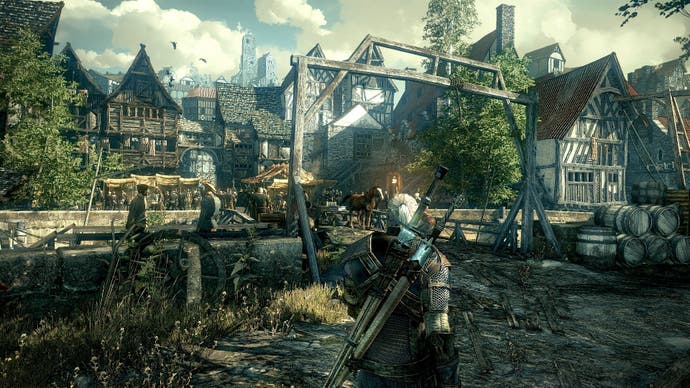
Everyone I meet fits the part. I've always admired the way CD Projekt Red can recreate the muck and filth of medieval times, and in The Witcher 3 the studio revels in it. The leathery faces are as worn and torn as the leather I wear, the noses bulbous, the eyes drooped by bags - as if the weight of the world were literally bearing down on them and everything around them. And it's beautiful. A red brick tower crumbles in the glowing evening light while a sky broods in juxtaposition behind it. There's colour, there's wonderful incidental detail - accoutrements, bits and pieces strewn here and there - and however vast the world seems - and the world is vast - each frame of your adventure feels full.
Yet in four-and-a-half hours I've seen only a drop of what this grand adventure offers (100 hours split between main and side-quests apparently). Perhaps I've seen the better bits, perhaps there's chaff elsewhere. But what I want to do is see more, and that's the crux of it. I persevered with Dragon Age: Inquisition until I accepted the world and fiction and the game got going, but I didn't need to do that here.
It makes sense to me that Geralt would be wandering a world looking for monster hunting work because that's what witchers do. And just as it's easy to accept A Game of Thrones because it's about people rather than fantasy, so here it's easy to accept The Witcher 3 - a story about a mutated man and whatever humanity he has left. Perhaps it will be only in the moments where The Witcher 3 transcends the sum of its parts. Or perhaps it will be as a whole - for its staggering, cohesive open-world.
This article is based on a press trip to Scotland. Namco Bandai paid for travel and accommodation.
